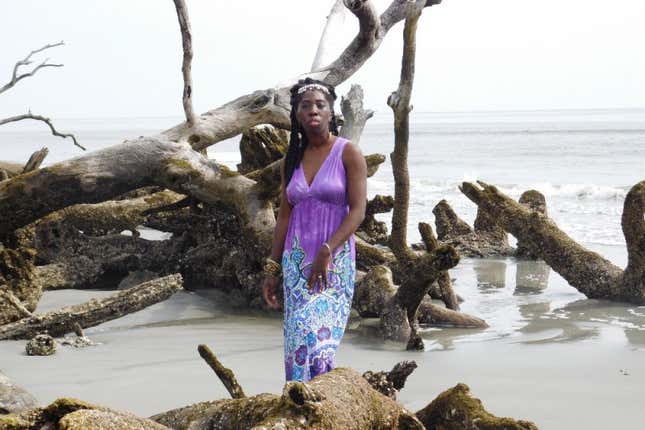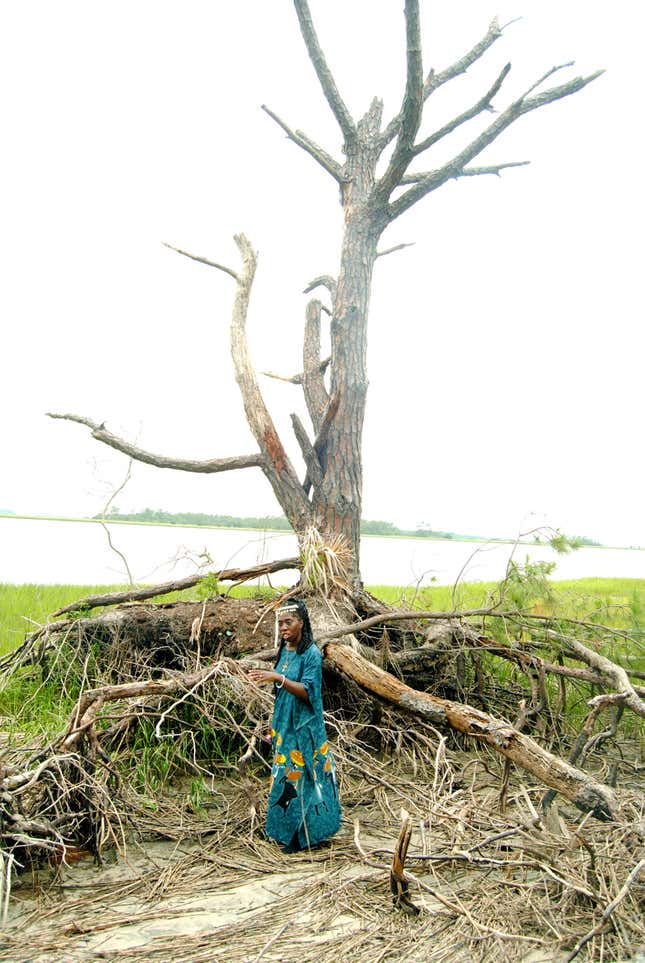
ST. HELENA ISLAND, S.C.–Ed Atkins Jr., 68, is proud of his family tradition. He’s a third-generation fisherman and owner of Atkins Live Baits and Local Oysters, which was started by his mother and father. But Atkins is worried that the effect of climate change on the waters are hurting not only his business, but also the traditions of his Gullah-Geechee community.
“I’m out there every day, and mostly every night,” says Atkins, who has been catching fat shrimp, oysters and mullet since he was a child. But now the warmer waters are sharply affecting the fishing that has been not only a tradition, but central to the existence of the African American community descended from enslaved West Africans that has lived on the coast in the Lowcountry for four centuries.
“The last several years there’s been a lot of changes. People wonder how I catch live shrimp year-round. That’s because the water temperatures have warmed up, and the shrimp don’t migrate to deeper waters like they did in the past,” Atkins says.
Then, there’s the oyster problem.
“The oysters are depleting because you get a lot of bacteria in the water. In the years before now, when cool weather comes it kills a lot of the bacteria in the water. But if it doesn’t get cold enough, now the bacteria remain in that water all year round and it kills the oysters,” explains Atkins. “Once the oysters die the bed dies and you get more pollution in the water.”
For a people that have survived on farming and fishing in a coastal area that used to be isolated, the changes are threatening the survival of the Gullah-Geechee people, who are proud of the way they have retained their cultural heritage.
“Black people in the 1960s and ’70s, that’s all they depended on. They made it fine—even during the Depression back in the ’30s. They made a living, didn’t go hungry and had someplace to get something to eat—either farming of fishing,” Atkins remembers. “But if [climate change] continues, you’ll be able to farm a little bit, but you won’t be able to fish too much.”
Queen Quet, chieftess and head of state for the Gullah-Geechee nation, says her community has been sounding the alarm about the dangers of climate change for more than 20 years.

“Most people in the world are mainlanders, and island people have very unique, distinct cultures and traditions and we know we can’t live without what’s going on with the water. Everything in our life has to do with it,” Queen Quet says, noting that warnings about obvious signs like damaged trees standing in saltwater along the shorelines of the Sea Islands have fallen on deaf ears amid an increased focus on now-expensive waterfront property.
“The trees are laying down along the shoreline. They’re not standing up. They’re laying down and there’s no storm, no wind, there’s something wrong,” Queen Quet says, adding that the general response from local governments was “‘Yeah, you know we’ve got other priorities.’ Until you lose 10 to 20 feet of shoreline and then you have people, especially in the gated communities around here saying they want a permit to build a wall to protect their property.”
Queen Quet, an activist, historian and computer scientist, has spoken before the United Nations and many other organizations, including Congress. She says the Gullah-Geechee community is doing all it can to protect itself and its land.
“We’re working with global partners because we get a lot more global partners than we do United States partners with the work we do, especially as related to climate change, and sea level rise and ocean acidification,” Queen Quet says, ticking off other danger signs. “We’re seeing flooding on clear days; on sunny days, why are roads flooding? Then you realize: because the sea level is higher by several feet than it used to be. Not only is the temperature of the water changing, but we also had the salinity of the water changing.”
Tropical biologist Carlos Chacon, manager of Natural History at the Coastal Discovery Museum on Hilton Head Island, S.C., says warmer weather and warmer water is affecting plants, sea turtles, shrimp and oysters among many other creatures, particularly in sea level communities in the Lowcountry.
“I think we are in a position that is way more vulnerable just by the fact of being at sea level and ocean front,” Chacon explains. “This is where the storms hit, and it is more vulnerable for the sea-level rise that is triggered by climate change. We are having serious problems. Coastal areas, sea level areas, island—all of those places are having dramatic effects.”
Chacon says climate change is causing dramatic changes globally, particularly for plants, insects, reptiles and animals whose reproductive cycles are triggered by length of day as well as the temperature of the water and the air. The severity of storms including hurricanes is increasing in the Lowcountry, and beach erosion is on the rise as well.
“Everything is changing, and I can’t say what is going to happen because nobody knows. It never happened before,” Chacon says.
He also has some thoughts about why some don’t realize the seriousness of the problem. The changes are happening now, he says, within a single generation. Things like glaciers, coral reefs and polar bears may become the subject of tales and history, like dinosaurs.
“It’s a very complicated and very big problem, and then obviously politics are involved and unfortunately politicians don’t usually think in a big time frame,” Chacon says, “they think on their next election cycle. It’s not something you can fix in four years, and most voters don’t want to learn that their houses are in peril.”
Queen Quet says one possible solution is following the traditions of the Gullah-Geechee community, which already lives in balance with the land and the waterways.
“We have never overfished. We do not do building patterns that build into the coastline. We are not people who go out and derby fish, meaning to try and take everything you can out of the creek. We are communal people,” Queen Quet says. “One of the critical things is just trying to encourage our younger people to get with the elders so that they know how to live in the traditional way that we live, because that will sustain them. It has been sustaining us and our ancestors for over 400 years.”

